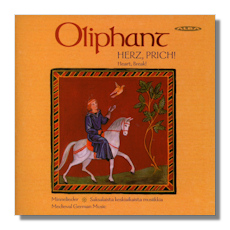
The Internet's Premier Classical Music Source
Related Links
-
Reuental Reviews
Rügen Reviews
Wolkenstein Reviews - Latest Reviews
- More Reviews
-
By Composer
-
Collections
DVD & Blu-ray
Books
Concert Reviews
Articles/Interviews
Software
Audio
Search Amazon
Recommended Links
Site News
 CD Review
CD Review
Herz, prich!

Medieval German Music
- Hans Sachs:
- Wacht auff ir werden Christen
- Oswald von Wolkenstein:
- Ain graserin durch külen tau
- Du ausserweltes schöns mein herz
- Wer ist, die da durchleuchtet
- Herz, prich, rich, sich
- Mit günstlichem herzen wunsch ich dir
- Grasselick lif!
- Ain tunckle farb von occident
- Frölich geschrai so well wir machen
- Walther von der Vogelweide:
- Under der linden an der heide
- Mir hat her Gerhart Atze ein pfert
- Wizlaw von Rügen:
- De Unghelarde heft ghemaket ene senende wise
- Neidhart von Reuental:
- Blozen wir den anger ligen sahen
- Mönch von Salzburg:
- Wenn ich betracht die gueten nacht
- Heinrich von Meißen (Frauenlob)
- Wer half Adam us not in füre
- Anonymous, Schedels Liederbuch
- O wie gern und doch enpern muss ich alzeit
Oliphant
Alba ABCD292
This is a splendid collection of German music from the twelfth to the sixteenth centuries. In under an hour, sixteen distinctive and beautifully evocative accompanied songs are performed with style and commitment by the Swedish ensemble, Oliphant (Uli Kontu-Korhonen, chant, drum; Eira Karlson, fiddle, slide trumpet; Leif Karlson, lute, symphony, percussion; Janek Öller, recorders, hümmelchen, bomba). The four person group specializes in medieval music – performed on period instruments where possible. The perform with an "edge" that's at the same time gentle, considered and highly communicative. Indeed, the acoustic on this CD is close and warm without being at all cloying. That has the result of thrusting the very essence of the words (whose articulation is clear and penetrating) and the production of the sounds – on the fiddle, for instance – to the forefront of our attention over and above any more general impression we may have as a result of the music's strong aural flavor.
Works like Under der linden [tr.3] and De Unghelarde heft [tr.4] have an almost modern feel to them, so distilled and concentrated is Oliphant's delivery – especially by singer, Uli Kontu-Korhonen. Her breath control is neither disguised nor emphasized. But one is aware that she (and the players too, of course) is immersed in the material – and enjoying it very much. Two aspects of the recital strike one: the variety and pleasing alternation of periods, compositional styles and instrumentation. And the delicate yet generous approach which has been employed to authenticity… where, for example, a touch of "swing" is called for as in Blozen wir [tr.6], there it is; but neither excessively nor self-consciously. Nor is their singing and playing anything but highly idiomatic. They expose the music in a very real and authentic way.
It's almost as though such stylistic enrichment is "offered" as being one possible interpretation – or aspect – of the music. But in such a way that it illustrates the music itself, its conventions, its composer's intention; rather than a rather gauche affect of the performers. Oliphant also manages implicitly to suggest those components and features of the repertoire which were common to composers as distant in time as Walther von der Vogelweide, who was born in the twelfth century, and Hans Sachs, who died in the sixteenth. The very title of the CD, "Break, my heart" is, of course, an allusion to one such commonality.
Pride of place on the CD is given to Oswald von Wolkenstein, by whom there are eight delicious and winning songs. A composer with, it seems, a large ego, von Wolkenstein has a more important place in musical development than is often accorded him. He deserves to be better known and more frequently performed. Oliphant helps to push his cause in no small way on this CD. Like many greats, he combined purely technical advances (although his hoquetus style was already out of fashion) with great originality and an almost carefree, throwaway irreverence while at the same time saying much.
Also of interest is the mysterious Mönch von Salzburg (Salzburg monk), whose Wenn ich betracht [tr.7] dates probably from the later fourteenth century; and the only purely instrumental piece, the brief O wie gern [tr.13] from the fifteenth century Schedels Liederbuch. Again, the playing is clean, unostentatious and, as a result, is quietly communicative; above all it's very enjoyable. This is typical of the feel and execution of the entire CD.
The booklet that comes with this CD from Alba is highly informative with background to the genres explored here, information on Oliphant and the texts in German, English and Swedish. This is a pleasing and refreshing CD. Yet it lacks affectation or self-consciousness of any kind. Lovers of the repertoire will want to hear these original, expertly-conceived and performed works from five centuries and shouldn't hesitate even where they have alternative interpretations of several of them already. Recommended.
Copyright © 2011, Mark Sealey.





















